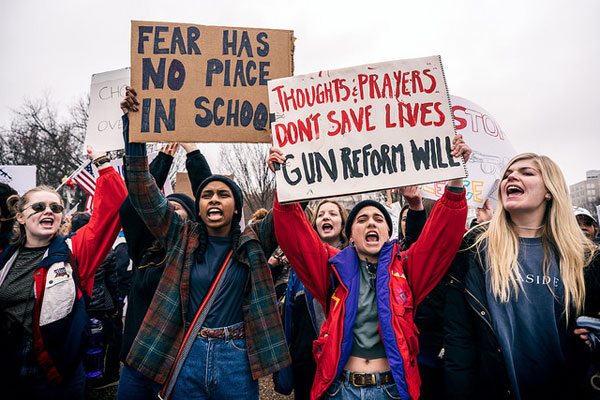
February 21, 2018; New York Times
If there’s one thing that should come out of this past week, it’s that the generation currently in high school is willing and able to exercise their civic muscle with eloquence and focus. But the responses they’re getting may inadvertently answer some of their questions about why adults left them to take their chances in the line of fire created by an out-of-control gun culture.
A group of students from Marjory Stoneman Douglas High School in Parkland, Florida, the site of last week’s shooting, went to Tallahassee, the state capital, yesterday to urge lawmakers to impose new restrictions on guns. They had spent the night nearby in a civic center on cots, just a week after the shooting, wondering how their voices would be heard. And what they heard was relatively shameless.
Florida’s Senator Aaron Bean, a Republican, was stopped by reporters as he rushed into the building. When asked for comment, he said, “I’m really, really sad. It’s a very sad situation. Kids shouldn’t have to worry about that. It’s already tough enough being a teenager, without worrying about things like that.”
But was he willing to vote for gun restrictions? “It’s just too early to say.”
Instead of committing to support the restrictions on semi-automatic weapons that the young people sought, Senator Debbie Mayfield, another Republican, told the young people who had just lived through the trauma, “We can’t stop crazies.” Afterward, sixteen-year-old Amanda De La Cruz lamented, “I want the ban on semiautomatic weapons. I don’t care about the crazies.”
Richard Corcoran, Florida’s Speaker of the House, vowed to them to unveil what he said would be the most sweeping gun reform package in the nation’s history by week’s end. Nevertheless, when 16-year-old student Alondra Gittelson asked, “I just want to know why such a destructive gun is accessible to the public—why that gun, the AR-15, that did so much damage, how is an individual in society able to acquire such a gun,” Corcoran responded that he was against banning the military assault-type weapon used in the attack that killed 17 of their classmates and teachers.
Sign up for our free newsletters
Subscribe to NPQ's newsletters to have our top stories delivered directly to your inbox.
By signing up, you agree to our privacy policy and terms of use, and to receive messages from NPQ and our partners.
“I think that if you look,” he said, “it’s widely used in multiple different hunting scenarios,” he said. “I know people who go out and they’ll do boar hunts and they’ll use them.”
“I understand your question,” Corcoran added. “And we’ll look at it, but I’ll just be honest with you: Me personally, I don’t believe that’s the solution.”
By the afternoon, hundreds of supporters had joined the students and the tone grew more demanding.
“Shame! Shame! Shame,” they shouted outside Governor Rick Scott’s offices. Outside of Corcoran’s, they chanted “Face us down! Face us down! Face us down!”
In other communities across the country, similar actions were taking place. Students back in South Florida walked miles from their own high schools to Stoneman Douglas for a rally. At other schools—in Chicago, Pittsburgh, and Phoenix—thousands left their classrooms to stand silently for 17 minutes. In those places, too, messages went out to students about their right to speak, even in the most extreme situations. At Needville High School outside Houston, administrators threatened to impose a three-day suspension on any student who protested. “Life is all about choices and every choice has a consequence whether it be positive or negative,” Curtis Rhodes, the superintendent, said in a statement posted on Facebook. “We will discipline no matter if it is one, 50, or 500 students involved.”
Meanwhile, at a special “listening session” held with President Trump, the president made several commitments, including taking a serious look at arming teachers and other school staff. “A gun-free zone to a maniac—because they’re all cowards—is, ‘let’s go in, and attack.’” The students, of course, were asking for fewer guns in their schools—not more.—Ruth McCambridge












